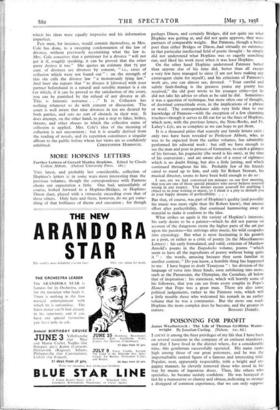MORE HOPKINS LETTERS
Further Letters of Gerard Manley Hopkins. Edited by Claude Colleer Abbott. (Oxford University Press. 16s.)
THIS latest, and probably last considerable, collection of Hopkins's letters is in some ways more interesting than the previous volumes, though the correspondence with Patmore cheats our expectation a little. One had, unjustifiably of course, looked forward to a Hopkins-Bridges, or Hopkins- Dixon duet, played with a virtuosity exceeding even that of these others. Only here and there, however, do we get some- thing of that brilliance of theme and execution ; for though perhaps Dixon, and certainly Bridges, did not quite see what Hopkins was getting at, and did not quite approve, they were partners of comparable weight. But Patmore, though a better poet than either Bridges or Dixon, kad virtually no existence in that particular intellectual field of poetic thought : he simply did not understand what Hopkins was so eagerly searching out, and liked his work most when it was least Hopkins.
On the other hand Hopkins understood Patmore better than anyone else of his time did, better than all except a very few have managed to since (I am not here making any extravagant claim for myself), and his criticisms of Patmore's work are, one can almost say, devoted. " Your careful and subtle fault-finding is the greatest praise my poetry has received," the old poet wrote to his younger critic—yet he did not take his advice so often as he said he did. Sometimes it was a question of technique, but more often one of thought, of doctrinal correctitude even, in the implications of a phrase
or word. The correspondence adds very little then to our knowledge of Patmore—with the exception of a few charming touches—though it serves to fill out for us the lines of Hopkins, which now, with the previous letters, the Note-Books, and Fr. Lahey's Life, are as complete as we can hope to get them.
It is a thousand pities that scarcely any family letters exist : only two have been revealed' to Professor Abbott, who, as was to be expected from the earlier volumes, has admirably performed his editorial work : but still we have enough to see the man and poet in process of formation, to catch a glimpse of his fervour, his pugnacity (the word is his own), at the time of his conversion ; and are aware also of a sense of rightness which is no doubt fitting, but also a little jarring, and which continued throughout his life. Probably few of his friends cared to stand up to him, and only Sir Robert Stewart, his musical director, seems to have been bold enough to do so :
I saw, ere we had conversed ten minutes on our first meeting, that you are one of those special pleaders who never believe yourself wrong in any respect. You always excuse yourself for anything I object to in your writing or music, so I think it a pity to disturb you in your happy dreams of perfectibility. . . .
But that, of course, was part of Hopkins's quality (and possibly his music was more right than Sir Robert knew), that intense effort after perfectibility, that continual hammering away at material to make it conform to the idea.
What strikes us again is the variety of Hopkins's interests, his early desire to be a painter—which he did not pursue on account of the dangerous strain the higher parts of the art put upon the passions—his strivings after music, his wild escapades into etymology. But what is most fascinating is his groWth as a poet, or rather as a critic of poetry (in the Miscellaneous
Letters) : his early formulated, and valid, criticism of Matthew Arnold's poems in the Empedocles volume, poems " which seem to have all the ingredients of poetry without being quite it " : the words, amusing because they seem familiar in another context, " Do you know, a horrible thing has happened to me. I have begun to doubt Tennyson " : his division of the language of verse into three kinds, soon exfoliating into more, such as the Parnassian, the Olympian, the Castalian, all below that of inspiration : his statement, which will horrify some of his followers, that you can see from every couplet in Pope's Homer that Pope was a great man. There are also some political judgements, rather in the Patmore vein, which will
a little trouble those who welcomed his remark in an earlier volume that he was a communist. But the more one reads Hopkins the more complex does he become, and the greater in














































 Previous page
Previous page